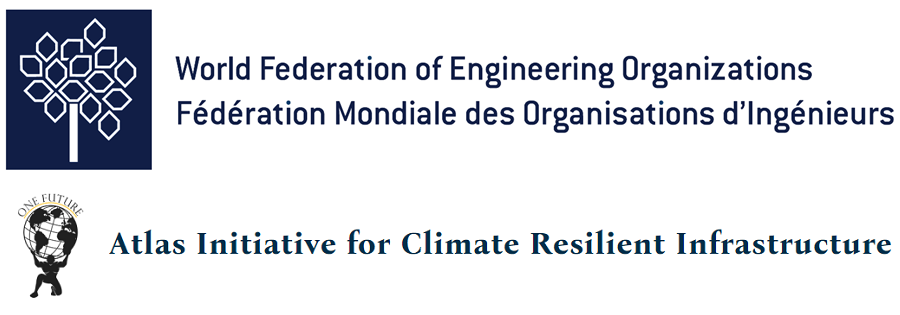
On 18 October 2024, leaders of the World Federation of Engineering Organizations (WFEO), representing some 30 million engineers, and its sister organization, the Atlas Initiative for Climate Resilient Infrastructure (Atlas), a global leader in sustainability and disaster resilience, held a bilateral meeting with high-level representatives of the World Bank on the sidelines of the World Bank Group Annual Meeting in Washington, DC. They underscored their shared commitment to creating a world without poverty on a livable planet and their plans to collaborate on sustainable infrastructure.
Representing some 30 million engineers and national engineering society members in over 100 countries, WFEO is increasingly looked to as a global engineering community that is responsible for envisioning, planning, designing, building, and retrofitting over $3 trillion of infrastructure each year. The Atlas Initiative for Climate Resilient Infrastructure has working relationships at the highest reaches of government, finance, civil society, and the private sector.
Working together, our organizations are organizing to meet the rising demand for more and better infrastructure, especially in the developing world. Engineers are increasingly joining hands with public and private financing institutions to augment and improve the quality of infrastructure and its climate and disaster resilience.
“Our organizations have come to this Annual Meeting to express our appreciation and support for World Bank President Ajay Banga who has inaugurated a new wave of visionary leadership, reaching out to new voices and creating innovative financing ideas which will rejuvenate the Bank’s essential role in the world,” said President Shehu. “Partnership is the best way forward.” WFEO and Atlas are leading global efforts to promote a sea change in global investments in sustainable infrastructure. As the Atlas President Dr. Gunalan points out: “We have developed principles, guidelines, and standards required in procurement to lift infrastructure to improve the quality of life for all, reduce poverty, leave no one behind, and accelerate the achievement of the Sustainable Development Goals. Too often, climate disasters combined with poor infrastructure have resulted in catastrophes, causing death and destruction and primarily hurting poor communities who lack the resources to build back better.”
“No organization can solve the challenges of the 21st century, meet the sustainable infrastructure demands, or address the climate crisis without trusted partners,” noted Michael Sanio, Executive Director of Atlas.
Four specific work streams to effectuate our shared commitment to sustainable infrastructure were identified. First, we intend to support the Bank’s remit to supercharge its efforts to promote knowledge as a development tool. Secondly, we will provide consensus standards and quality guidelines for disaster resilient infrastructure to support the Bank’s new sustainability criteria in procurement. Thirdly, we will join hands with the Bank to foster capacity building in Africa and showcase models for other regions. Fourthly, we will work together to close the gap between AI’s exponential growth and its need for clean energy, hardened grids, and physical infrastructure as well as exploring how AI can support disaster resilience.
“As climate change worsens, engineers have a global responsibility to call attention to the need for climate resilient infrastructure that will minimize the scope of future disasters. We are supportive of the Bank’s new Knowledge Compact for Action where such interdisciplinary thought leadership is needed and appreciated. And we have offered our services and engineering talent to strengthen the Bank’s Global Facility for Disaster Reduction and Recovery.”
We are particularly impressed with the initiative to create the Global Collaboration CoFinancing Platform that was formed by organizing ten of the largest multilateral development banks to act collectively for large transformational projects that will be globally significant and lift communities, cities, and countries to new levels of prosperity and safety.
“Institutions either innovate or die,” said Mr. Jerry Buckwalter, Global Director of Innovation for Atlas. “By adopting and using the tools of AI and the new suite of emerging technologies for the energy transition and disaster resilient infrastructure, the multilateral development banks have a window of opportunity to leverage new partnerships with the private sector and open a new era of leadership”. The Bank’s new Digital VP, for example, can act as a headlight for these transformational technologies and channel their breakthroughs to drive the energy transition.
“The developing world in Africa, Asia, Latin America, and island states need the World Bank, especially now that the Bank is beginning to reestablish its relevancy and leadership to help the people and planet meet the daunting challenges of the 21st century,” declared President Shehu. “We are fully aligned with the Bank’s new Knowledge Compact for Action. By extending its expertise that is second to none, the Bank can better leverage global engineering talent to improve its operations and funding efficacy.”
“Now that the Bank is beginning to reestablish its relevancy and leadership, it is vital that that the developed countries step up to take advantage of this new wave of leadership by President Banga and provide the increased capital that will be needed to be true to its founding purpose, live up to its bold new mission, and meet the daunting challenges of the 21st century,” declared Jan Hartke, Chairman of Atlas.
For media inquiries, please contact WFEO Junior communication and projects manager Jessica Bailloux at communication @ wfeo . org
NOV
2024
